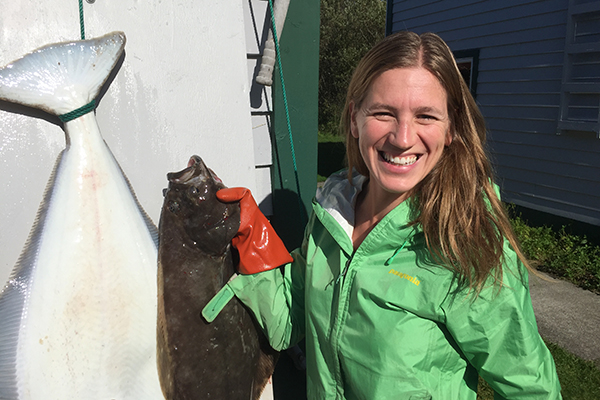
Fisheries fellowship
UD graduate studies Alaskan halibut fisheries through NOAA Sea Grant fellowship
1:38 p.m., Oct. 13, 2015--Halibut, flatfish that can grow up to 8 feet long and weigh several hundred pounds, are known for their flaky white meat and appealing flavor. But in Alaska, halibut are more than a dish — they’re a means of livelihood.
“Everyone in Alaska is somehow connected to or impacted by the fishing industry, whether it’s subsistence, commercial or recreational,” said Marysia Szymkowiak, a University of Delaware alumna who earned her doctoral degree in marine studies this summer.
People Stories
'Resilience Engineering'
Reviresco June run
Szymkowiak spent the last two years in Juneau, Alaska, completing her doctoral work under a marine resource economics grant from National Oceanic and Atmospheric Administration (NOAA) Fisheries and NOAA National Sea Grant Office.
Advised by Lee Anderson, professor emeritus in the College of Earth, Ocean, and Environment's School of Marine Science and Policy (SMSP) and a renowned international fisheries specialist, she studied the measures taken to protect fisheries and the communities that rely on them.
In this process, Szymkowiak connected with Ron Felthoven at the NOAA Alaska Fisheries Science Center (AFSC). He helped her apply for and secure the NOAA grant to support her thesis work and became her NOAA mentor for the project.
Protecting Alaskan fisheries
Szymkowiak traveled to Seattle to work with AFSC and then moved to Alaska to work with the National Marine Fisheries Service (NMFS).
Through the grant and with access to NOAA data, she analyzed Individual Fishing Quotas (IFQs), which provide fishermen with the privilege to harvest a given quantity of fish each year. IFQs are designed to prevent overfishing and unsustainable or wasteful practices, encouraging efficiency in the industry.
Under the program, fishermen who can make more money from selling their shares than from harvesting their fish can leave the fishery and sell their permit shares to more efficient operators.
However, these IFQs can have unexpected negative impacts on surrounding communities if fishermen don’t enter and exit the market the way policymakers anticipate. One loophole, for example, is that some fishermen lease their shares or use hired skippers to run their vessels.
These behaviors make it difficult for new fishermen to enter the market, and compromise the stewardship mindset traditionally held by original shareholders. Original shareholders are given a right to the fishery through their permit — their stake in the fishery is like their property, so they feel compelled to protect it.
Hired skippers, on the other hand, who only “rent” the right to fish may have less incentive to protect the fishery through sustainable fishing practices.
Szymkowiak studied the factors that influence fishermen to enter or exit the fishery, and the likelihood that they would lease their shares to other fishermen or use hired skippers. Understanding influences on fisherman behavior can help policymakers anticipate how they will act in quota programs, and thus what the effects of program implementation will be.
She found that behaviors are influenced by the number of shares fishermen hold, as well as where the fishermen reside. This year, she is expanding on that research as an Alaska State Sea Grant Fellow, working with NMFS’s Alaska Regional Office and the North Pacific Fishery Management Council to conduct a comprehensive overview of the Alaska halibut and sablefish IFQ program.
Through her Sea Grant Fellowship, Szymkowiak aims to help the North Pacific Council, which regulates the IFQ program, better understand the social and economic impacts of the program.
“The halibut and sablefish IFQ program is a truly unique endeavor in fisheries management because it includes a multitude of measures intended to protect various stakeholders and fisheries dependent communities,” Szymkowiak said. “Twenty years into the program, we can evaluate what has and has not worked and apply those lessons to other management programs.”
Interdisciplinary exposure at UD
Szymkowiak said her opportunities and networking at UD, and subsequently through NOAA, helped her develop a strong research career in an interdisciplinary field essential to sustainable fisheries management.
“Researchers in the marine policy program in CEOE are economists, engineers, policy analysts all doing varied studies and bringing together many different perspectives on interdisciplinary research,” Szymkowiak said.
Szymkowiak also gained valuable environmental science research experience as an Oak Ridge Institute for Science and Education (ORISE) Fellow in the United States Environmental Protection Agency prior to coming to UD. The program grants one- to two-year fellowships for undergraduates, graduate students and recent graduates to work in a government agency.
Szymkowiak corresponded with Anderson during her ORISE fellowship. Ultimately, the interdisciplinary marine sciences program and the opportunity to study under Anderson drew Szymkowiak to apply to the UD doctoral program.
“I wanted comprehensive, interdisciplinary exposure in my doctoral program and experience,” Szymkowiak said. “I definitely got that at UD.”
Article by Caren Fitzgerald








